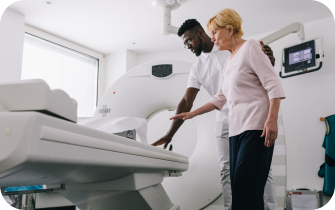
How your treatment is monitored
Learn how your doctor and care team will monitor your progress while you’re going through treatment.
During and after treatment, your doctor may use image scans or lab testing to monitor:
- If your treatment is working
- Any new changes to the cancer (if it has grown, shrunk, or spread)
- If the cancer has come back (recurrence)
- If there are signs of cancer treatment side effects

Cancer imaging scans
While it’s common for imaging scans to help diagnose cancer, doctors may also use scans to help monitor your treatment and how your cancer is responding. These scans may include:

CT (computed tomography) scan
A CT scan is also called a CAT scan. It creates a 3-D picture of your body using x-rays to take pictures from different angles.

MRI (magnetic resonance imaging) scan
An MRI uses powerful magnets to take detailed pictures of the inside of your body.

PET (positron emission tomography) or PET/CT scan
A PET scan uses a radioactive sugar, sometimes called a tracer, injected into your body to find and measure the spread of cancer. The tracer makes cancer cells look brighter than healthy cells on the pictures made by the scanner. A PET/CT combines PET with a CT scan to pinpoint the location of tumors in more detail.
It’s normal to feel anxious before a scan. Sometimes people call this “scanxiety.” Read this article to learn more about living with uncertainty and coping with scanxiety.
You can also watch this video about what to expect before a scan to help you feel calmer before the procedure.
Cancer lab testing
Laboratory tests, or “labs,” are tests that give your doctor more details about the cancer or how your treatment is working. Labs use a sample of a bodily fluid, like blood or urine. Here are some of the most common labs you may need:

CBC (complete blood count)
A CBC lab test will tell your care team about the blood cells in your body, including platelets, red blood cells, and white blood cells.

Chemistry panel (metabolic profile)
This lab test looks at a blood sample to measure things like electrolytes, enzymes, fats, proteins, and sugars in your body. This helps doctors know how well your body is working.
What do my cancer lab results mean?
If you get your lab results before speaking with your doctor, it may not be helpful to interpret them on your own. Contact your doctor so they can tell you what your results mean. In the meantime, keep calm and try to distract yourself. Remember, your doctor is the best person to tell you what your labs really mean.
Who is on my care team?
Your care team can help you throughout your entire journey. Find out who may be part of your care team and how each team member supports you.
US-KEY-08331 09/24





